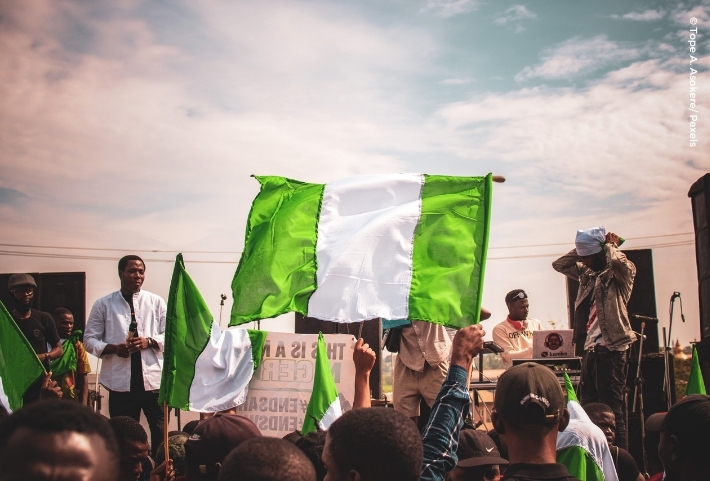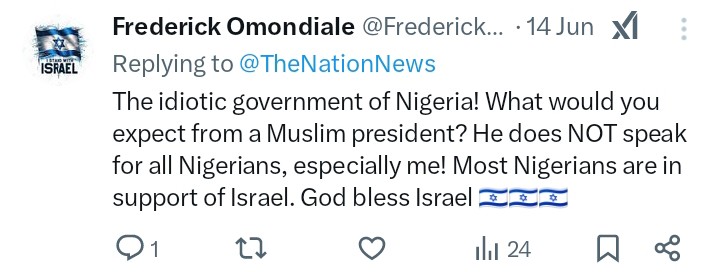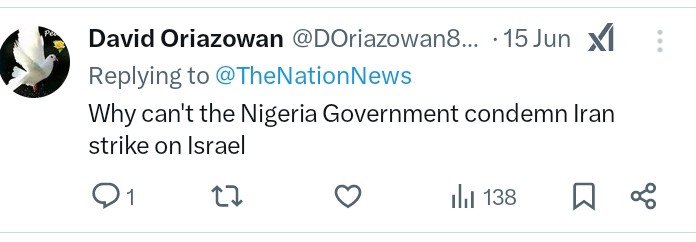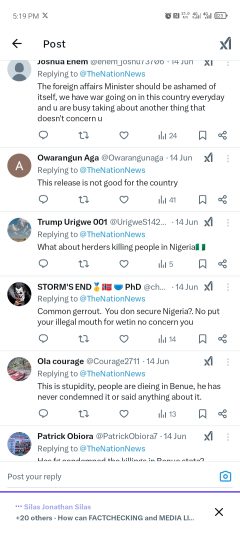When U.S. President Donald Trump declared a fragile ceasefire on Monday, June 23, via his official X (formerly Twitter) account, he framed the Iran-Israel conflict as a “12-day war”. While that announcement redirected much of the African media’s attention back to local concerns, the temporary ceasefire did little to erase the deeper impression the war had left on Nigeria’s media and society.
As global attention focused on this intense Middle East confrontation, Nigerian media outlets along with their audiences became unusually engrossed. But the issue wasn’t just of foreign policy interest. It was what the war unearthed inside Nigeria: a complex, deeply polarised media environment reflecting the country’s entrenched religious and ethnic divisions.

So, why do Africans care about a Middle Eastern War?
Africa is no island. Like the rest of the world, it is enmeshed in the political and economic implications of global conflicts. In the case of the Iran-Israel war, the rising oil prices alone sent ripple effects through African economies, heavily dependent on imports and energy. But beyond economics, the continent especially Nigeria has longstanding religious and ideological ties to the Middle East. For Nigerian Muslims, Iran symbolizes Islamic resistance. For Christians, Israel holds biblical significance as the land of God’s chosen people. In this context, it shows that the war wasn’t just about foreign affairs. It became a lens through which Nigerians interpreted their identity, solidarity, and politics.
The Nigerian Media Ecosystem
When the conflict broke out on June 13, Nigerian newspapers raced to break the story. But their coverage was not uniform. Rather, it was often tailored to the regionally dominant religious or ethnic sentiment of their readership. The media knew this was the “hotcake” issue of the moment, a guaranteed driver of engagement and ad revenue. But what was lost in this scramble for clicks was any pretence of neutrality.
Nigeria’s media is heavily regionalised. Outlets like The Punch, The Nation, and Vanguard operate largely from the Christian-majority South, while Daily Trust and Blueprint are based in the Muslim-majority North. This geographical divide aligns closely with how the conflict was framed in headlines and stories. It’s important to remember that Nigeria is home to over 250 ethnic groups and three major religions. These demographic factors don’t just affect elections or policies they shape how international events are consumed and reacted to on a national scale.
Headlines That Deepen Fault Lines
On June 14, The Nation posted a news story on its X handle which read: “FG Condemns Israel’s Attack on Iran, Calls for Immediate De-escalation.” The same headline, or slightly modified versions of it, appeared in Daily Trust and other prominent outlets. The language was clear and one-sided. It portrayed Israel as the aggressor, implicitly casting Iran in a more sympathetic light. To many Christian readers, this imbalance felt not only offensive but incendiary.
Meanwhile, The Punch published a far more neutral headline: “Nigeria Urges Restraint Amid Escalating Iran-Israel Conflict.” This choice of words avoided assigning blame and promoted a more balanced view. The contrast between the headlines wasn’t trivial; it reflected the deeper ideological positions of their respective audiences and editorial boards.
More striking was an opinion piece published by Daily Trust, titled “The Compelling Courage of Islamic Republic of Iran”, authored by a former government official. The headline framed Iran’s military action not as aggression, but as heroism, pushing an emotional narrative of Islamic resistance. The article minimised Israel’s actions and emphasised Iran’s moral high ground, clearly resonating with Muslim readers. However, it alienated many Christians who saw the framing as a form of media-endorsed religious bias.
That means the media didn’t create Nigeria’s religious divisions, but they amplified them. For Christian audiences, headlines praising Iran or criticizing Israel appeared to dismiss biblical narratives that view Israel as a sacred homeland. For many Muslims, support for Iran aligned with broader Islamic solidarity, particularly among the Shi’a-leaning communities in Nigeria’s North.
What emerged was a fracture not just between media outlets, but among the people themselves. Social media platforms like X and Facebook became battlegrounds for competing narratives, religious allegiance, and misinformation.



Ownership and Editorial Agenda
One cannot ignore the role media ownership plays in shaping coverage. Many Southern-based newspapers are owned and edited by Christians. Northern publications like Daily Trust and Blueprint are managed largely by Muslims. This correlation is not incidental; it is central to how news is selected, framed, and disseminated.
The print media in Nigeria remain especially powerful. They often dictate the narratives followed by broadcast media, which reach broader, often less literate audiences. In effect, each media outlet becomes a cultural and religious echo chamber. This undermines national cohesion and makes it difficult for Nigerians to agree on basic facts especially when those facts intersect with faith and identity.
Ethical Journalism
Amid the tension, media experts have called for greater responsibility. Caleb Ijeoma, Executive Director of Round Check, a Nigerian fact-checking initiative, emphasised the importance of evidence-based reporting.
“The media should not entirely depend on social media as their source of information this time,” Ijeoma noted. “Prior to the war, there was a lot of disinformation online which I personally had to fact-check.”
He warned that in a polarised country like Nigeria, the consequences of biased reporting go beyond misinformation; they can fuel real-world unrest, deepen divisions, and inflame already sensitive interfaith relations.
The Iran-Israel war was not Nigeria’s war. But the way it was reported and reacted to says a great deal about the country’s internal challenges. Media outlets, instead of rising to the occasion with balanced and inclusive coverage, largely reinforced existing divisions. Headlines became weapons of cultural allegiance rather than tools of public enlightenment.
“In a country grappling with insecurity, gloomy economy, political instability, inter-religious mistrust, journalism can be a force for unity, not disintegration. The Iran-Israel conflict may fade from the front pages, but the fractures it exposed in Nigeria’s media and society are far from healed,” Ijeoma told MDI.
The views and opinions expressed in this article are solely those of the author and do not reflect the official policy or position of the Media Diversity Institute. Any question or comment should be addressed to [email protected]
